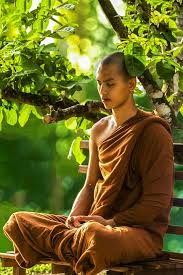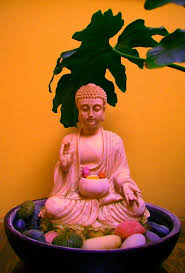Buddhism is a belief system tailored for the individual on a “vision quest”; the individual who identifies with being “a work in progress”; the individual who yearns to be self-sufficient and self-reliant. Within the Buddhist, eternal cycle of “samsara”, (or birth and re-birth), the individual is always in prime focus; always in the process of self-generated becoming. The work is never complete until “nirvana” is attained. In many ways, there is a clear parallel with the Australian Aboriginal concept of “The Dreaming”. This “ancient” dreaming has no clear beginning and no clear past because the ancestral beliefs and legends always live in the variables of the moment, preparing for future pathways. So it is with the Buddhist individual.
According to the Buddhist Dhamma, the individual answers to no one except self.
“By oneself alone is evil done, by oneself is one defiled. By oneself is evil avoided, by oneself is one purified. Purity and impurity depend on oneself. No one can purify another.”
In other words, no one sets the life goals nor gives salvation except the individual’s own “life force”.
Choices are not offered by some omniscient power. One choice is not “pre-valued” higher than the other. The individual makes life choices which seem to best suit the moment and best suit connections with positive future moments.
The individual is all about “the power of one”. But that does not mean walking “lonely”. The Dhamma is there as a guide. The Four Noble Truths and the Noble Eightfold Path handed down by the Buddha are there as signposts. But the final answer, the final response to a situation rests with the individual.
The process of becoming involves regular, daily, constant hard work and effort. To be a Buddhist is to:
*Identify with an empty vessel, waiting to be filled.
*Negate earthly cravings and stand firm in the face of suffering.
*Desire spiritual fulfillment more than worldly satisfaction.
*Reach for a positive state of mind; aim for mental perfection.
*Long to be at one with the universe.

To maintain this process, meditate, and meditate some more. Meditation heals the mind and body. To the Buddhist, mind and body are part of the larger ecosystem of the conscience. They both inter-relate and are not uniquely separate. A healthy mind enhances a healthy body; a healthy body enhances a healthy mind. It is up to the individual to cultivate this optimum health balance. When anger in the mind brings pain to the body, meditate to dissolve the imbalance. Meditation brings peace and equilibrium.
This individual centering in Buddhism is not a statement of superior ego. It is less a statement of affirmation – “I am” – than a statement of positive thinking – “I can be”, or, even better, “I will be”. The Buddhist individual is constantly aware of personal shortcomings, constantly trying to maintain moral and spiritual values well above conditioned, material values.

The Buddhist individual must be constantly aware of the power of karma. To achieve a desirable consequence, carefully think around the “rightness” of the action first, before acting. Accumulate too much bad karma, and the cycle of birth and re-birth must begin again, addressing the shortfalls.
There is no judgment day for the Buddhist individual. In simple terms, the individual reaps what is sown. Sow the seeds of living well, blend with the seasons, watering the crop as needed. And the harvest will be a measure of personal care. That is the power of the Buddhist individual.





